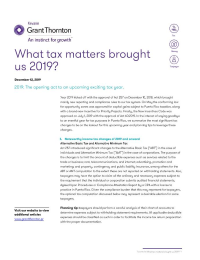-
Financial statements audits
Financial statement audits
-
Compliance audits
Compliance audits
-
Compilations and reviews
Compilations and audit
-
Agreed-upon procedures
Agreed-upon procedures
-
Tax compliance
Business Tax
-
Global mobility services
Through our global organisation of member firms, we support both companies and individuals, providing insightful solutions to minimise the tax burden for both parties.
-
Sales and use tax and indirect taxes
SUT/ VAT & indirect taxes
-
Tax incentives
Navigating the complex landscape of tax incentives in Puerto Rico can be challenging. Whether you're looking to benefit from the Export Services Act (Act 20), the Individual Investors Act (Act 22), or other incentives under Act 60, we provide tailored advice to help you maximize your tax benefits and ensure compliance. Let us help you unlock the potential of doing business in Puerto Rico.
-
Transfer Pricing
The laws surrounding transfer pricing are becoming ever more complex, as tax affairs of multinational companies are facing scrutiny from media, regulators and the public

-
Business consulting
Our business consulting services can help you improve your operational performance and productivity, adding value throughout your growth life cycle.
-
Business Risk Advisory
Risk is inevitable but manageable. We deliver relevant, timely and practical advices to aid organizations manage risk and improve business performance. We can help you identify, understand and manage potential risks to safeguard your business and comply with regulatory requirements.
-
Technology Advisory
We provide comprehensive solutions to safeguard your business and ensure operational resilience and compliance. Our expert team offers a range of technology advisory services designed to address your cybersecurity needs, enhance business continuity, and manage security effectively.
-
Transactional advisory services
Transactions are significant events in the life of a business – a successful deal that can have a lasting impact on the future shape of the organizations involved. Because the stakes are high for both buyers and sellers, experience, determination and pragmatism are required to bring deals safely through to conclusion.
-
Forensic and investigative services
At Grant Thornton, we have a wealth of knowledge in forensic services and can support you with issues such as dispute resolution, fraud and insurance claims.

2019: The opening act to an upcoming exciting tax year.
Year 2019 kicked off with the approval of Act 257 on December 10, 2018, which brought mainly new reporting and compliance rules to our tax system. On May the conforming law for opportunity zones was approved for capital gains subject to Puerto Rico taxation, along with a brand-new incentive for Priority Projects. Finally, the New Incentives Code was approved on July 1, 2019 with the approval of Act 60-2019. In the interest of saying goodbye to an eventful year for tax purposes in Puerto Rico, we summarize the most significant tax changes to be on the lookout for this upcoming year and planning tips to leverage these changes.
I. Noteworthy income tax changes of 2019 and onward
Alternative Basic Tax and Alternative Minimum Tax
Act 257 introduced significant changes to the Alternative Basic Tax (“ABT”) in the case of individuals and Alternative Minimum Tax (“AMT”) in the case of corporations. The purpose of the changes is to limit the amount of deductible expenses such as services related to the trade or business; rent, telecommunications, and internet; advertising, promotion and marketing; and property, contingency and public liability insurance, among others for the ABT or AMT computation to the extent these are not reported on withholding statements. Also, taxpayers may have the option to claim all the ordinary and necessary expenses subject to the requirement that the individual or corporation submits audited financial statements, Agreed Upon Procedures or Compliance Attestation Report by a CPA with a license to practice in Puerto Rico. Given the compliance burden that this may represent for taxpayers, the optional tax computation discussed below may represent a desirable election for some taxpayers.
Planning tip: taxpayers should perform a careful analysis of their chart of accounts to determine expenses subject to withholding statement requirements. All applicable deductible expenses should be classified as such in order to facilitate the income tax return preparation with the proper documentation.
Analysis should be performed under the mindset that if a certain expense is not reported in a withholding statement, it will not be deductible for income tax purposes. This represents a new responsibility of taxpayers, their service providers and tax return preparers that should be planned for accordingly.
Optional Tax Computation
For taxable years commencing after December 31, 2018, an Optional Tax computation is available for individuals, corporations, partnerships, and corporations of individuals (referred to as “taxpayers”) that derive 80% or more of income from services that are withheld at source. The tax must be covered by withholding or estimated tax payments. The amount that is not derived from services will be taxed at normal tax rates established under the Internal Revenue Code of Puerto Rico. If the optional computation is elected, the taxpayer will be taxed on gross income at rates ranging from 6% to 20% depending on gross income. Since there are many new compliance requirements for claiming expenses, all taxpayers should evaluate whether they have a more favorable tax compliance scenario under the optional tax computation.
Planning tip: taxpayers should know whether they will elect the optional tax computation for 2019 on or before January 15, 2020 because this is the last day to remit the estimated tax payment for the last quarter of 2019.
See our Tax Alert published on September 9, 2019
II. SUT changes adopted by Act 257
Puerto Rio Sales and Use Tax (“SUT”) eliminated in some services
Effective on March 1, 2019, the SUT was eliminated for: (i) designated professional services, and (ii) services rendered to other merchants by persons whose annual volume of business does not exceed $200,000. Learn more in our Tax Alert published on March 1, 2019/.
SUT rate reduction for prepared foods
Effective October 1, 2019, the SUT was reduced to 7% for certain restaurants selling taxable items considered as prepared food, carbonated beverages, confectionery products, and candy. According to Administrative Determination 19-03, merchants that meet the following requirements will be eligible to receive authorization to collect and remit the reduced SUT rate:
- Merchant Registration Certificate must show at least one of the following NAICS Code: 72231, 72232, 72233, 72241 or 72251;
- must be in compliance with the filing of all SUT returns;
- must not have any tax debt with Puerto Rico Treasury; and
- must maintain a fiscal terminal in each point of sale even if the annual volume of business does not exceed $125,000.
See our Tax Alert published on September 19, 2019.
III. Opportunity Zones in Puerto Rico – List of Priority Projects established by Resolution 19-01
Approximately 98% of Puerto Rico is considered an opportunity zone under the federal incentive adopted as part of the Tax Cuts and Jobs Act of 2019. To really put the island on the map for US and Puerto Rico investors, on May 2019 the government of Puerto Rico adopted conforming legislation in connection to the capital gain deferral, discount and total elimination on certain cases, and additional preferential rates to Priority Projects. On August 2019, the following types of projects were designated Priority Projects by a resolution issued by the local Opportunity Zone Committee:
- development of residential real property that is a Low-Income Housing Project as defined in Section 42(g) of the US Internal Revenue Code of 1986, as amended, or by the Puerto Rico Department of Housing, for sale or rent;
- development of residential and/or commercial real property for sale or rent;
- development of industrial real property for sale or rent; and
- substantial improvement of an existing commercial property for sale or rent.
Planning tip: taxpayers with recently realized capital gains, or who plan to realize such capital gains, should evaluate the numerous investment opportunities in Puerto Rico. In addition to federal level incentives, the island offers incomparable incentives at the opportunity zone business level, including green energy projects, residential and commercial property for sale or rent (including low-income housing projects), manufacturing, tourism, and many others. Refer to our Tax Alert published on August 15, 2018.
IV. Additional developments to keep in mind for 2020
House Bill 2172 (“HB 2172”) is a technical amendments bill intended to amend the Internal Revenue Code of Puerto Rico, the Incentives Code, and adopt other rather unexpected legal provisions. Tax matters addressed in HB 2172 include:
- Current rule: For taxable years commenced after December 31, 2018, the Secretary of Treasury will allow an individual to claim the totality of his/her ordinary and necessary expenses related to the trade or business if his/her income tax return is filed with either an Agreed Upon Procedures Report or Compliance Attestation report prepared by a Puerto Rico CPA
- HB 2172 – Individuals with a volume of business less than $750,000 can opt to comply with the requirement above by submitting a due diligence checklist sworn by a Accountant-Specialist, provided that the maximum amount that can be certified by the due diligence checklist will be 25% of the individual’s volume of business
- Current rule: The business must submit audited financial statements when the volume of business is $3,000,000 or more
- HB 2172 - Increases that threshold to $10M and establishes that businesses with a volume of business between $3M and $10M will have the option of submitting an Agreed Upon Procedures or Compliance Attestation Report by a Puerto Rico licensed CPA, instead of audited financial statements
HB 2172 also adopts a Private Equity Funds Act of 2019, which among other matters, reverts the portfolio diversification rule from 50%, as adopted under the New Incentives Code to 20% which was the original threshold under Act 185-2014.
However, it fails to revoke the analogous provisions under Act 60-2019 which creates an uncertain scenario for private equity funds. It also expands green energy incentives to producers of highly efficient energy. Furthermore, it adopts a Police Retirement Trust Act which, it is still under scrutiny by the Fiscal Board and pending the Governor’s approval.
The government of Puerto Rico is also under the challenge of modifying excise tax provisions of Act 154-2010, after the September 2019 announcement by US Secretary of Treasury, of the imminent elimination of the creditability of the tax for US federal tax purposes.
We expect even more action in 2020, with the required pronouncements by the Puerto Rico Treasury, the publication of final regulations by the IRS for opportunity zones, and the adoption of regulations under the New Incentives Code.

